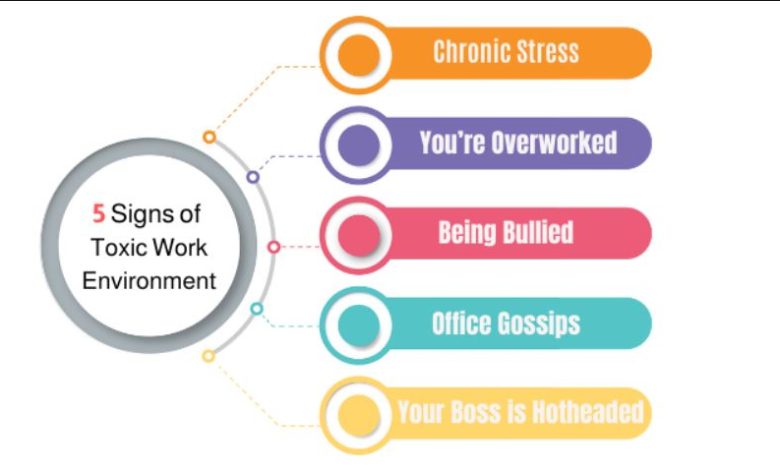Signals of a Toxic Work Environment

Working in a toxic work environment can be a difficult and stressful experience. While it may be hard to recognize the signs of a toxic work environment, it is important to be aware of the warning signs so that you can take the necessary steps to protect yourself and your career. In this blog post, we will cover the three most common signs of a toxic work environment: unhealthy competition, unclear goals and expectations, and poor employee morale. By understanding these signs, you will be better equipped to handle any toxic environment you may come across.
Read More : tom von reckers
Unhealthy Competition
Employees in today’s workplace are constantly under pressure to perform. It seems like every day, there is another article or video about how competition among coworkers is bad for morale and productivity. Unfortunately, this type of competition isn’t healthy at all. In fact, it can lead to mistrust, negativity, gossiping, and blame-shifting. All of which is counterproductive in the workplace.
Here are four ways that unhealthy competition damages productivity and morale in the workplace:.
- It leads to a lack of communication. When everyone is trying to outdo each other, it’s difficult to share information or collaborate on tasks. This results in a lack of cooperation and teamwork – two essential ingredients for success in any organization.
- It creates a culture of negativity. When employees are constantly competing with each other instead of cooperating, it becomes difficult to have constructive criticism or give credit where credit is due. This leads to a negative environment where employees feel frustrated and demoralized instead of motivated and inspired.
- It encourages gossiping and spreading rumors. When coworkers are focused on their own agendas instead of working together towards common goals, they’re more likely to talk negatively about others behind their backs (gossip). This can create a climate of distrust that harms both the individual victims and the entire team as a whole.
- It leads not only within the workplace but also outside it as well. When employees feel like they’re always fighting against each other rather than collaborating or supporting one another, they’re less likely to support themselves in their personal lives as well (eccentricity at work affects your life outside work too!). In short: unhealthy competition hurts everyone involved – both those who compete aggressively and those who get caught up in the chaos along with them!
So how do you avoid unhealthy competition from taking over your workplace? The first step is communication – start sharing information openly so that everyone knows what’s going on! Next, make sure that your organizational culture focuses on collaboration rather than competition – this will lead to more productive outcomes for everyone involved! And finally, make sure that your rewards reflect genuine achievement rather than simply meeting artificial deadlines or performing at an elevated level (overworking employees won’t get recognition as they want). With these simple steps, you can create an environment that is conducive to success – not just individual success but team success as well!
Also, Read More: Powerful Steps to Achieve Career Advancement
Unclear Goals and Expectations
When it comes to goals, it’s important that everyone on the team is on the same page. This helps to ensure that everyone is working towards the same goal, and it leads to better performance. However, this is often not the case in businesses today. Instead, there is a lack of coherence between different departments or initiatives, which can lead to employee burnout and low morale. This lack of communication also creates a series of strained working relationships that can lead to poor team performance.
In addition, micromanagement often causes an environment of fear where employees are constantly second-guessing their actions and are afraid to make mistakes. As a result, employees are unable to properly set realistic expectations and monitor progress which can lead to frustration and uncertainty. Finally, with so much change happening all the time, employees find it difficult to keep up – this creates a downward spiral in morale.
If you’re struggling with unclear goals and expectations in your workplace, it may be time for a change. By implementing strategies such as goal-setting frameworks or clear communication channels between departments, you can help restore coherence and improve team performance.
Poor Employee Morale
Employee morale is essential to a healthy workplace, and it’s sadly often neglected in favor of other priorities. When employee morale is low, it can lead to a number of problems. For example, engagement levels will be low, which means that employees are less likely to be motivated to do their best work. This can lead to a high turnover rate, as employees feel unfulfilled and disengaged in their job. In addition, when employee engagement is low, it’s difficult for teams to communicate effectively and make decisions collectively. This can lead to tension and conflict between team members, as well as confusion about what roles each person should play.
To address the issue of poor employee morale, it’s important to have clear communication policies and procedures that everyone understands. It’s also important to ensure that all employees are recognized for their hard work – even if the recognition doesn’t come in the form of a pay increase or promotion. Finally, make sure that expectations are realistic and not overly burdensome – otherwise, employees will feel resentful or frustrated with their job. By taking these steps, you can help restore employee morale and hopefully improve the overall productivity of your team!
The Warning Signs of Employee Unhappiness
When an employee is unhappy in their job, it can have serious consequences. For example, an unhappy employee is more likely to be stressed out and have low morale. They may also be more likely to feel unappreciated or not have a clear role in the workplace. In fact, research has shown that unhappy employees are almost three times as likely to quit their job compared to happy employees.
Below, we will outline some of the warning signs that indicate that an employee may be unhappy in their job. Once you’ve identified these signs, it’s important to take action and address them. Doing so will help to restore harmony and productivity within the workplace, which will ultimately benefit both you and your employees.
- Excessive stress: Employees who are constantly under pressure are often unhappy at work. This is because they feel like they’re not able to handle the demands of their job well. If you notice that your employees are experiencing a lot of stress at work, take steps to help them relieve this tension. This could involve offering flexible hours or scheduling breaks into their day so that they can relax and decompress.
- Long working hours: It’s no secret that long work hours can be stressful – especially if you’re not sure what your role in the workplace is supposed to be. If you find that your employees are working long hours without any indication of progress or success, take measures to change this situation immediately. This could mean giving them additional training or assigning them new tasks that better fit their skillset.
- An unclear role: If an employee doesn’t know what their responsibilities are or why they’re doing certain things, they’ll likely become disgruntled quickly. Make sure all employees know exactly what their role is within the organization and why it’s important. This way, there will be no confusion about what’s expected of them and they’ll be able to carry out their duties with ease.. (This isn’t always possible – for example, if your company has a large number of part-time positions – but ensuring there’s clarity, in general, will go a long way).
- Employees feeling unappreciated or not having ownership over decisions: When an employee feels like they’re not being given opportunities for growth or advancement, it can lead them down a bitter path. Make sure every employee knows where they stand within the organization and communicates regularly with management so everyone understands where each individual stands. This way there won’t be any surprises when decisions need to be made. Additionally,
To Conclude
Everyone deserves to work in a safe and healthy work environment. It is important for employers to be aware of the warning signs of a toxic workplace, such as unhealthy competition, unclear goals and expectations, and poor employee morale. By recognizing these signs early on, employers can take steps to address them and create an environment where employees can thrive. If you are concerned about any of these warning signs at your workplace, it is important to take action now so that you can ensure your team remains productive and motivated.



